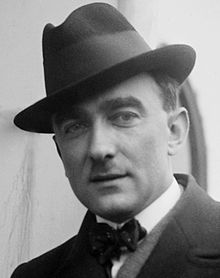Hagith (opera)
| Hagith | |
|---|---|
| Opera by Karol Szymanowski | |

The composer
|
|
| Librettist | Feliks Dörmann |
| Language | German |
| Premiere | 13 May 1922 Grand Theatre, Warsaw |
Hagith, Op. 25, is an opera in one act by the Polish composer and pianist Karol Szymanowski considered one of the greatest Polish composers of the 20th century. The opera premiered at the Grand Theatre, Warsaw in 1922, nine years after its creation. The libretto in German was written by the Viennese secessionist poet and Szymanowski's friend Felix Dörmann.
Szymanowski wrote the opera in 1912–1913 while living in Vienna, Austria. The piano-and-vocal score was first published by Universal Edition A.G. Vienna in 1920. Musically and dramatically, Hagith has been compared to Richard Strauss's Salome. The opera made its premiere on 13 May 1922 at the Great Theatre, Warsaw, Poland, and it has been produced four times. Szymanowski commissioned a Polish translation of the text (by Stanisław Barącz), but the project was not successful.
The opera was criticized and disparaged in the interwar Poland notably by critic (and writer of prayer songs) Stanisław Niewiadomski, a devout Catholic and former official in the Austrian Partition, as well as other clericalists, due to its author's openly gay lifestyle.
The libretto by Feliks Dörmann is loosely based on the Old Testament, with the emphasis on deception and jealousy in love and death, similar to other popular motifs in operatic works of the early 20th century including Salome and Electra by Strauss. Dörmann's Libretto tells a Biblical story of King David, the aged king in the opera, his female servant Abishag (Hagith) and Solomon (the young king), as described in Chapter One of the First Book of Kings. However, in the Bible, the young woman is called "Avishag", not Hagith. Haggith is one of the wives of David, the mother of Adonijah.
...
Wikipedia
